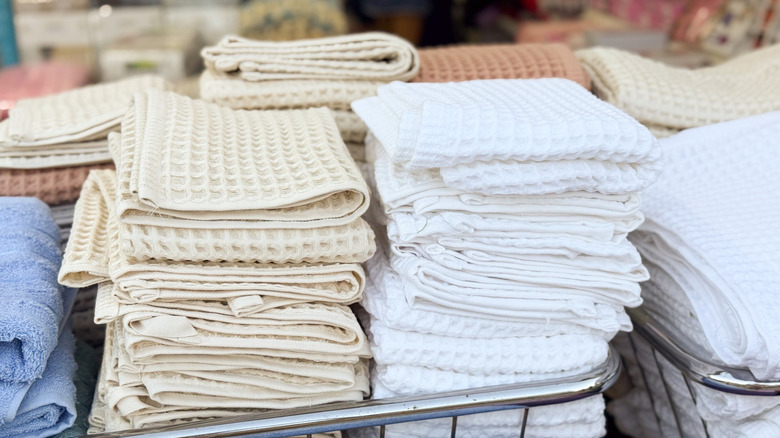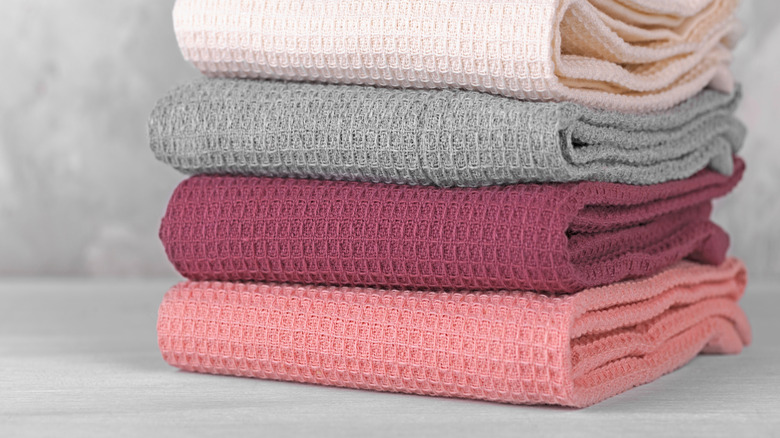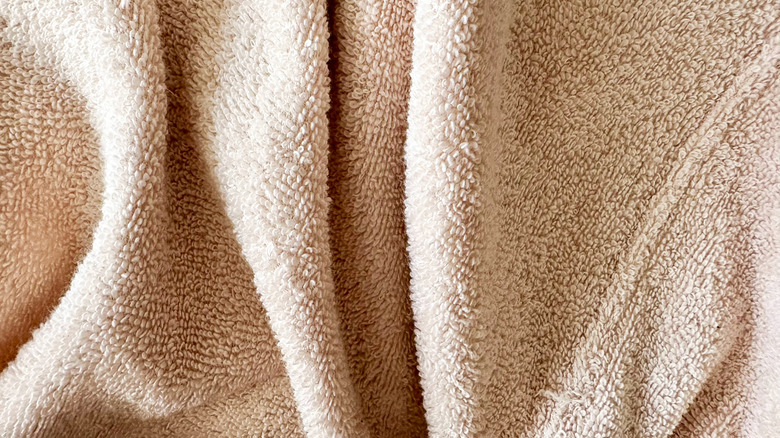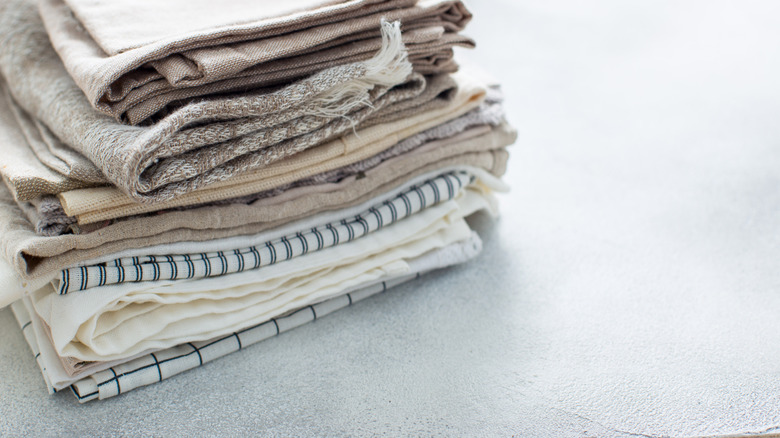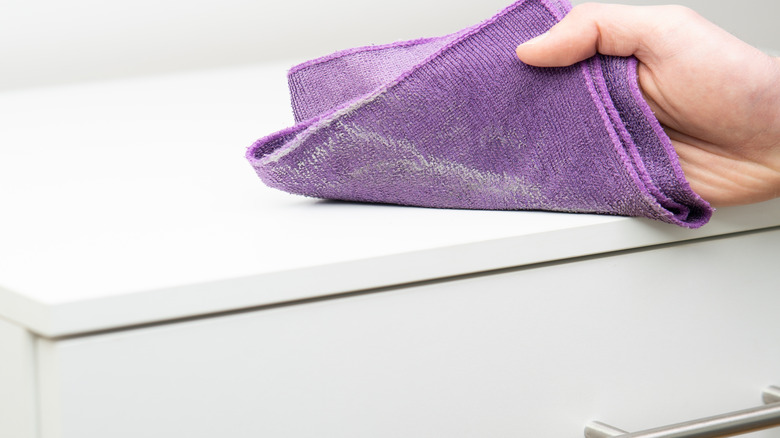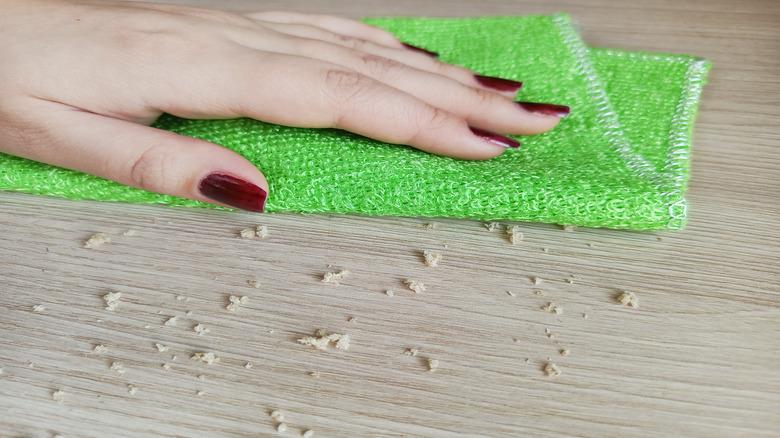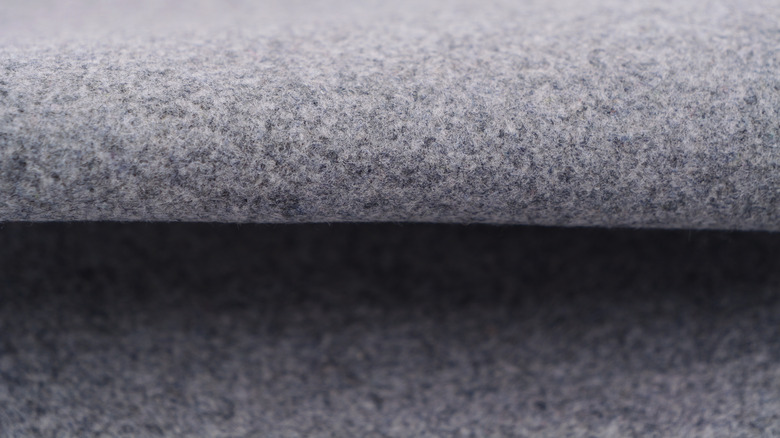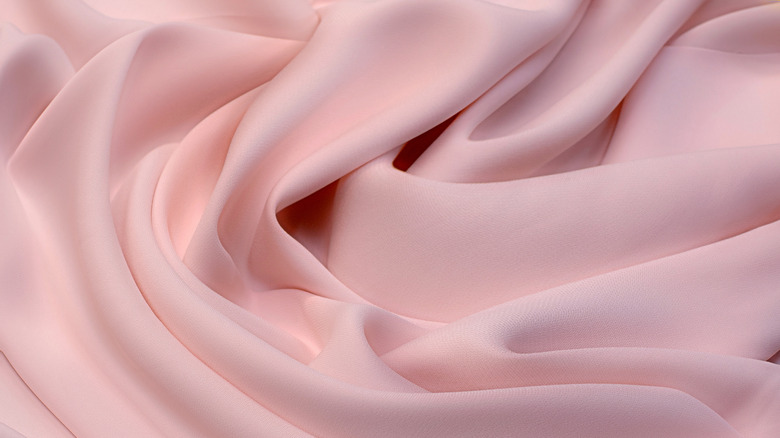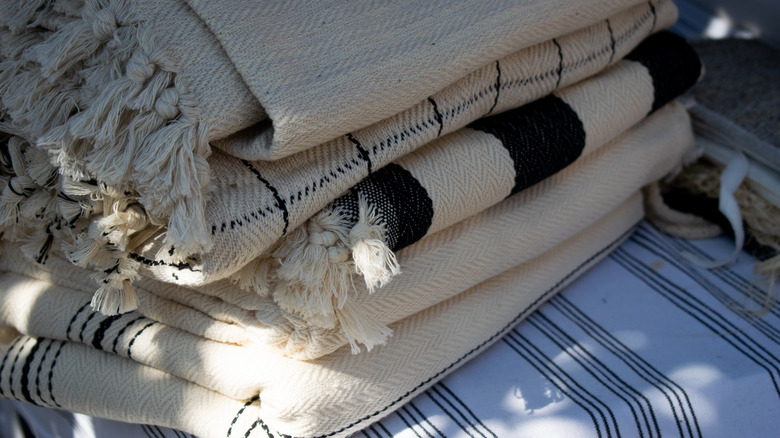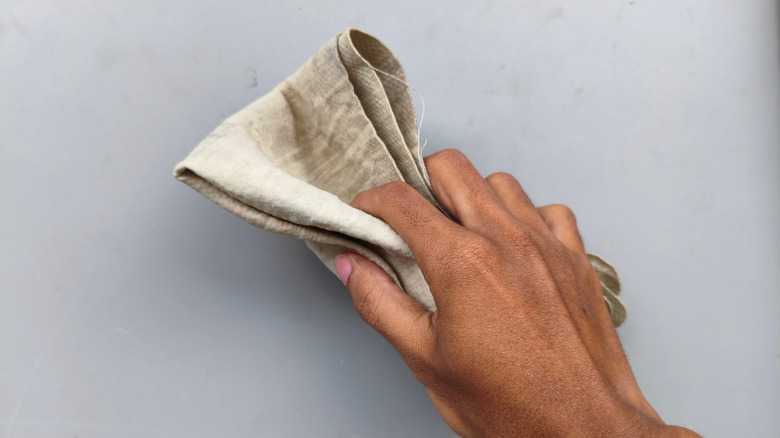9 Best Materials To Look For When Buying New Kitchen Towels
If you can't remember the last time you purchased new kitchen towels, this might be your sign to pick up a new set. Not only should you be washing your kitchen towels after each use, but experts recommend swapping them out for brand new ones every six months to one year, as well. If you're in the market for a fresh set, there are multiple fabric options to choose from, including Turkish cotton, linen, microfiber, and terry cloth. Each type of material has its own strengths and weaknesses, depending on your countertops and what type of messes you tend to clean up.
While terry cloth towels are best at mopping up liquid spills, microfiber is ideal for sweeping up crumbs, pet hair, and dust from your kitchen's surfaces. Ideally, you can have a combination of multiple towel materials to combat any type of mess. Before purchasing a random pack of dish towels from your local store, consider doing a little extra research to determine which ones would best benefit you and your home.
Organic cotton
Organic cotton is one of the most popular choices for a kitchen towel material. Cotton towels can vary in their weaves, from terry cloth to dual-sided, and the soft texture is perfect for absorption. This type of material also tends to be more durable, making it ideal for the kitchen. Unlike some other towels, which may break down after consistent use, organic towels can take on multiple spills and last longer thanks to the cotton's natural strength. Towels that are 100% cotton are typically the most affordable options for the kitchen, as well.
Terry cloth
Typically made of cotton, polyester, or a blend of both materials, terry cloth is a popular choice for both bath and kitchen towels, thanks to its highly absorbent structure. This type of fabric is made of numerous mini loops of thread, which help increase the surface area of the entire towel. Thanks to the tiny thread loops, terry cloth towels are also excellent at cleaning up spills, making them a great option for the kitchen.
Linen
There are a plethora of reasons to opt for linen towels in the kitchen. Most notably, they are extremely durable and can also dry much quicker than cotton towels. Besides their drying powers, linen towels and other linen items like sheets or napkins improve with age. In contrast, materials like cotton are more likely to fall apart. According to consumers, linen napkins don't hold onto foul odors and, since they're typically thin, are much easier to fold and store.
Microfiber
If you love a kitchen towel that doesn't shed, then microfiber towels might be the best choice for you. This type of fabric is preferred for tasks like drying and polishing, as it leaves your glasses streak-free. According to experts, microfiber towels are seven times more absorbent than cotton towels. They are also less likely to retain stains. When purchasing microfiber towels for your kitchen, note that some consumers find this type of material to be slow-drying, allowing for odors to lock in more quickly than other materials.
Bamboo
If you prefer a more eco-friendly option for your kitchen accessories, bamboo towels are an excellent alternative to the standard cotton or linen towels. Created from bamboo fibers, these absorbent towels can hold a ton of moisture and are even antibacterial, helping to keep your home free from foul odors. To keep your bamboo towels in shape, make sure to wash them using cold water and avoid putting them in the dryer. If you want an alternative to your standard paper towels, you can even purchase reusable versions made of bamboo.
Flannel
You might not expect a fabric like flannel to work well in the kitchen, but this material can actually be incredibly beneficial as a cleaning accessory. Flannel, which is typically made from cotton, wool, or a blend of synthetic fibers, is known for its softness, thanks to the process of "napping," which involves brushing the flannel to raise the fibers. Some homeowners even sew their own flannel towels, which are not only reusable but also eco-friendly. This type of material is best used for polishing, dusting, or cleaning up spills.
Rayon
Similar to bamboo towels, rayon is a semi-synthetic material manufactured from plants, usually wood, like beech, pine, or bamboo. There are several types of rayon, such as modal, lyocell, and viscose. If you're sourcing rayon for kitchen towels, you will want to opt for either modal or lyocell, as they tend to be more absorbent and durable. You can find towels made with blends of rayon and cotton for extra strength and long-lasting power. It's important to note that you should not put rayon in the dryer and should instead let it air dry to prevent shrinking.
Turkish cotton
As you can probably gather from the name, Turkish cotton is a type of cotton grown in Turkey, known for its soft-to-the-touch feel and high absorption. Turkish cotton sets itself apart by its extra-long staple cotton, which means this material is tightly woven and incredibly durable. While Turkish cotton is often used for bath towels, it can be utilized for kitchen towels, as well. It dries quickly and works better the more you use it, making it the perfect accessory for picking up kitchen spills.
Chamois
When it comes to cleaning sensitive surfaces, like stainless steel or granite, chamois cloths are an excellent choice. While chamois cloths were originally made from the skin of the chamois goat-antelope, they are now often manufactured from sheepskin or synthetic materials. Soft and absorbent, a chamois can help you keep your kitchen appliances streak-free, thanks to the napping process. You can also use a slightly damp chamois towel for easy dusting.
